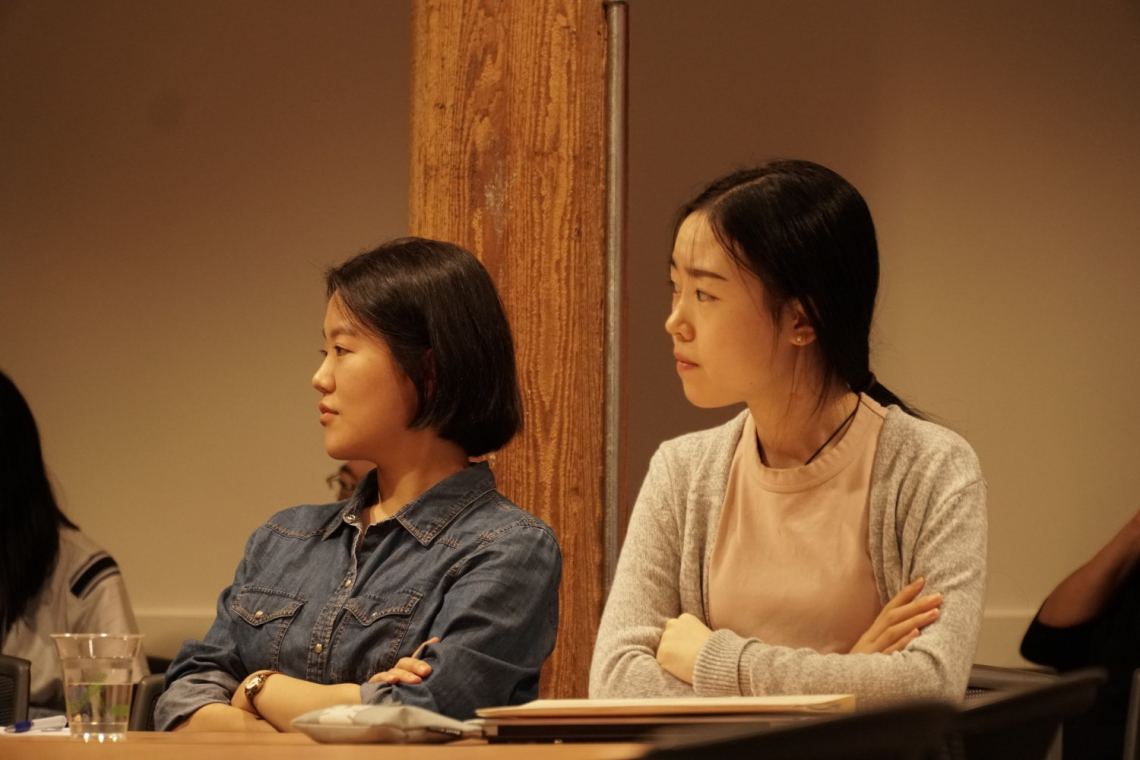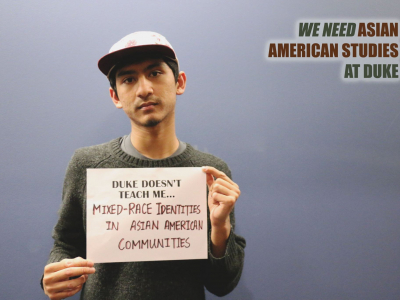After Student Activism, Duke Launches Asian American & Diaspora Studies Minor

After decades of advocacy and a unanimous vote from the Arts & Sciences Council in February, Duke undergraduates have a new option to consider when registering for fall 2022 classes: a minor in Asian American & Diaspora Studies.
The Asian American & Diaspora Studies Program (AADS) has partnered with the Department of Asian & Middle Eastern Studies (AMES) to offer the thematic minor, which will be housed in AMES and administered by AADS.
“AMES really was the natural choice,” said AADS Director Esther Kim Lee.
In October, AMES Chair Shai Ginsburg penned a letter to the Curriculum Committee in support of the minor, and throughout the multi-year process AMES faculty like Associate Professor Nayoung Aimee Kwon, who is also the founding director of AADS, have been steadfast and reassuring advocates.
“The faculty have been a consistent voice in championing efforts to build Asian American Studies at Duke, and a number of them specialize in transnationalism and Asian diasporic communities,” Lee said. “It just felt right.”
The long game
Although the minor clearly aligns with Trinity College’s mission to diversify the curriculum and promote anti-racism initiatives, the road to its creation was not easy. It took generations of student advocates to move the needle at Duke.
From the founding of the Chinese Student Association in 1971 to the first Asian American studies House Course in 1982 to the hiring of two tenure-track Asian American Studies professors in 2021, students like Shania Khoo have led the way.
Learn More
Drawing on previous work by Kwon’s fall 2019 Archiving and Visualizing Asia course and the Asian American Studies Working Group, Shawin Vitsupakorn, a junior majoring in Global Health and Biology and president of the Duke Southeast Asian Student Association, curated a comprehensive timeline documenting the history of Asian Americans at Duke.
A senior majoring in ethnic studies through Program II, Khoo has been actively advocating for Asian American Studies throughout their years at Duke. A member of the East Coast Asian American Student Union, Khoo participated in the recent tenure-track hires by assisting with job talks and interviews.
“Asked to take part in the recent faculty search was an important step,” Khoo says. “The students’ opinions were heard and valued, and the advocacy that occurred on this campus over the years has begun to be recognized.”
Thanks to the work of those students, as well as faculty like Kwon, AADS was created in 2018 as the first Asian American Studies program in the U.S. Southeast, and it is quickly becoming a leader in the region.
Dedicated to an interdisciplinary study of the people of Asian descent in the United States and an exploration the history, culture and experiences of Asian Americans and the Asian diaspora, the program focuses on the pan-Asian coalition of East Asian, Southeast Asian and South Asian Americans.
Anatomy of the minor
In the new minor, students will receive a more complete and robust understanding of American history.
The curriculum focuses on key Asian American events that contributed to the imagining and making of the country and imparts a fundamental knowledge about shared histories and how Asian Americans have been an integral part of the United States.
To satisfy the minor, students must take five courses, including one required history or general introductory course. Students can choose the remaining four electives from semester course lists, though at least one of those electives must be cross listed with AMES.
Current AADS course offerings draw from diverse disciplines across campus, including History; Theater Studies; Music; Gender, Sexuality & Feminist Studies and Religious Studies — and are being added to regularly.
Derek Uejo, program assistant with AADS, sees the minor as an important step towards recognizing the contributions Asian Americans have made, and continue to make, in the United States and at Duke. He believes the minor will provide important academic opportunities for all students — not only those who identify as Asian Americans.
“In an increasingly diverse but also fragmented nation, being able to understand different perspectives, perhaps perspectives not our own, is vital,” he says. “It will provide an opportunity for current and future Duke students to think alongside, listen to and speak with important historical and contemporary Asian American voices, not only in the classroom with our faculty, but also through literature, poetry, film, art and music.”
Return on investment
So where can graduates hope to land in the job market with a minor in Asian American Studies? According to Lee, anywhere they want.
She explains that the minor can prepare undergraduates for all career paths because it educates them to be more culturally knowledgeable.
“The minor is interdisciplinary and flexible,” she said. “It can benefit students’ education in many different ways, whether they want to pursue a career in medicine, law, public policy, business, the tech industry — there really are no limits.”
Kwon agrees that the AADS minor will prepare Duke students to be adaptable and able to engage in meaningful changes and challenges in the multicultural and globalizing world.
“Because we exist in an ever-diversifying job market, students with training in humanistic- and social science–based methodologies with cultural and historical awareness and fluency will be invaluable in an array of professions,” she said.
But this new academic opportunity goes much deeper than career aspirations for the countless students, faculty, staff and alumni who have advocated — over decades — for Asian American Studies at Duke.
Graduating shortly, Khoo, the Program II student, sees the minor as a huge step for the university in sending a positive message to its BIPOC students.
“The minor is really a huge step for Duke,” Khoo says. “It tells me that the university has heard the generations of student voices and is authentically committed to Asian American Studies.”
You’re Invited!
For those interested in learning more, Asian American Diaspora Studies will host a celebration of the minor on March 23, 2022, at 4:00 p.m. at Abele Quad, in front of Duke Chapel. All are welcome.






